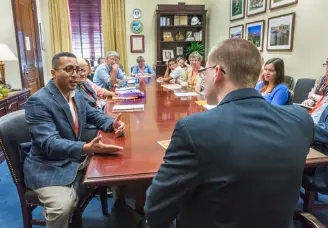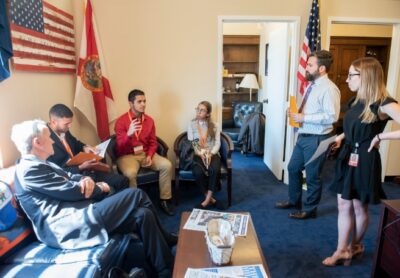
What Will Solve Hunger?
Ending hunger means people around the world have access to enough nutritious food all year round. It sounds like a daunting goal – if it’s possible, why haven’t we done it yet?
The world has made significant progress toward ending hunger over the past 50 years, but the pandemic set progress back and conflict and climate shocks are driving the current hunger and famine crises. Preventing and resolving conflict, finding solutions to climate shocks, and restoring lifesaving humanitarian assistance are key ingredients to achieve our mission.

When enough people speak up, government leaders listen.
Advocacy Works
Churches, charities, food banks, and nonprofit organizations can’t solve hunger alone. Government programs and policies play an especially important role. Thanks to an abundance of resources, federal nutrition programs provide 10 times as much food assistance as private churches and charities combined.
If the government prioritizes food security and directs policies and funding to the right places, our generation will end hunger in our lifetime. But there are thousands of issues demanding leaders’ attention. We need your help to convince government leaders to make ending hunger a priority.
When enough people speak up, government leaders listen.
Federal domestic nutrition programs such as SNAP, Women, Infants, and Children Program (WIC), and the school lunch program make a huge difference. These programs keep millions of Americans from going hungry. The U.S. also plays a critical role in providing humanitarian assistance in response to natural disasters and ongoing worldwide crises, from pandemics to conflicts.
When enough people speak up, government leaders listen.

Ending Hunger Takes More Than Growing Enough Food
The cause of hunger isn’t a shortage of food – it’s access to food, especially nutritious food. Ending hunger for good in the U.S. and around the world means addressing the root causes of hunger, such as poverty, climate change, conflict, unemployment, racial and gender inequity, and more. Programs for agriculture, health, education, the environment, and democracy are critical for countries struggling with extreme poverty.

For over 70 years, the U.S. has provided resources, technical expertise, and guidance to several organizations working to combat global food insecurity and malnutrition.
Humanitarian Assistance and International Aid
Development experts agree that the world has the ability to end extreme hunger within our lifetimes. We have already cut it in half since 1990. With restored and increased funding, U.S. international assistance can help cut it to zero.
The people of developing nations are proactively leveraging their own agency and resources to end hunger in their homelands. Assistance from the U.S. government has helped people help themselves. The U.S. has provided food and agriculture development assistance directly to countries through a specific U.S.-led initiative such as Feed the Future or a legislated program like Food for Peace. Other times, it has worked through international organizations to deliver, provide, and implement humanitarian aid and related assistance.
International aid programs have funded the tools and training for improved agriculture, build roads to get food to market, empower women, and help governments better educate, care for, and feed their people.
When disaster strikes, hunger often follows. Emergencies such as natural disasters, disease outbreaks, food shortages, droughts, and conflict have disastrous side effects – from refugee crises to gender-based violence. Emergency situations can quickly go from bad to worse if the global community does not respond quickly enough to prevent starvation, poor health, and extreme poverty.
For decades, the U.S. led compassionate responses to emergencies across the world. The federal government has provided immediate cash and food assistance, health and sanitation items, and supplies to help communities rebuild. It has also funded programs such as education, job training, and counseling services to help refugees adjust and find stability in an unfamiliar environment. The international aid community has long recognized the importance of linking short-term emergency response and long-term development assistance.
For over 70 years, the U.S. has provided resources, technical expertise, and guidance to several organizations working to combat global food insecurity and malnutrition.

Domestic Programs
The most direct way to end hunger is through food-assistance programs. The nation’s largest and most effective anti-hunger program is SNAP. The program gives families and people in need a debit-like card to buy groceries. In 2024, more than one in eight people participated in SNAP. Other programs include:
- School lunch and breakfast programs provide meals to 33.8 million low-income children so they can focus on learning at school. After school and during the summer months, children can also receive meals through after-school meals programs, SUN Bucks, and the Summer Food Service Program.
- WIC provides healthy food to low-income pregnant and nursing women and young children.
- The Commodity Supplemental Food Program, senior congregate, and senior home-delivered nutrition services provide healthy food to older Americans.
These programs help millions of families, but giving food is not enough. Progress against hunger requires helping families move out of poverty. Tax credits, like the Earned Income Tax Credit (EITC) and Child Tax Credit (CTC) help families keep more of their income, which they can use for essential expenses.
